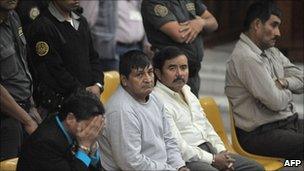Guatemala Dos Erres massacre soldiers sentenced
- Published

The four were sentenced to 30 years for each of the victims
Four former Guatemalan soldiers have been sentenced to life in prison for the massacre of more than 200 people during the country's civil conflict.
The court said the four had committed crimes against humanity when they were part of a counter-insurgency unit which carried out the killings in the village of Dos Erres in 1982.
They received a sentence of 30 years for each of the 201 victims.
They are the first former soldiers to be convicted for human-rights abuses.
Daniel Martinez, Manuel Pop Sun, and Reyes Collin Gualip were sentenced to 6,060 years in prison each for murder and crimes against humanity.
Carlos Carias received an extra six years for aggravated robbery, bringing his sentence to 6,066 years.
The massacre at Dos Erres is one of the most violent episodes in Guatemala's brutal 36-year civil conflict.
Hundreds of villagers were shot or bludgeoned to death and their bodies thrown down a well.
The number of victims is disputed.
The judge who sentenced the four put the number at 201, but relatives of the victims have always maintained the number was well over 250.
Counter-insurgency
The four accused were members of a special unit of the Guatemalan military, the Kaibiles.
Their unit entered Dos Erres in December 1982, during the time of the military ruler, General Efrain Rios Montt.
The military suspected the villagers of supporting or harbouring left-wing guerrillas.
Over a period of three days, the Kaibiles interrogated and then killed residents, including children, women and the elderly.
Many were raped and beaten before they were killed.
In 2001, then-President Alfonso Portillo acknowledged that 226 people had been killed and that the state bore responsibility for the massacre.
He awarded the relatives of those killed $1.8m (£1.1m) in compensation.
But until now, no-one had stood trial for the massacre, even though the case was first investigated in 1994.
And while prosecutors had asked for even longer sentences, human rights groups have welcomed the convictions, saying they hope it may signal the end of Guatemala's culture of impunity.
An estimated 200,000 people were killed in Guatemala's civil conflict, which ended in 1996.
- Published25 July 2011
- Published13 July 2011
- Published18 June 2011